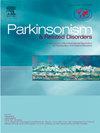迷你精神状态检查和蒙特利尔认知评估检测MCI和多系统萎缩痴呆的最佳截止分数。
IF 3.4
3区 医学
Q2 CLINICAL NEUROLOGY
引用次数: 0
摘要
背景:轻度认知障碍(MCI)和痴呆分别在多系统萎缩(MSA)患者中高达44%和7%。简短的认知筛查工具,如迷你精神状态检查(MMSE)和蒙特利尔认知评估(MoCA),用于检测MSA患者的MCI和痴呆的敏感性和鉴别能力尚未得到评估。目的:本研究的目的是确定MMSE和MoCA的最佳临界值,以准确区分MSA合并MCI和痴呆的患者与认知正常的患者。同时,对MoCA的流利性项目也分别进行了评估。方法:对62例MSA患者进行综合II级神经心理学评估,以诊断痴呆或MCI。ROC分析分别用于建立MCI和痴呆的最佳临界值。结果:根据II级神经心理学评估,MSA患者中有4.8%符合痴呆标准,53.2%符合MCI标准。痴呆的最佳MMSE分值为20.5分(AUC = 0.915), MCI的最佳MMSE分值为26.5分(AUC = 0.698)。对于MoCA,检测痴呆的最准确截断值为14.0 (AUC = 0.919),检测MCI的最准确截断值为19.5 (AUC = 0.702)。ROC分析表明,这两种测试在识别轻度认知障碍方面比识别痴呆更准确。MoCA流畅性项目识别MCI的最佳临界值为8.5个单词(AUC = 0.717)。结论:我们的研究结果支持MMSE和MoCA是检测MSA中MCI和痴呆的有效和可获得的工具。MoCA流畅性项目是检测MCI的可靠工具。本文章由计算机程序翻译,如有差异,请以英文原文为准。
Optimal cut-off scores for the Mini Mental State Examination and Montreal Cognitive Assessment to detect MCI and dementia in Multiple System Atrophy
Background
Mild cognitive impairment (MCI) and dementia are reported in up to 44 % and 7 % of patients with Multiple system atrophy (MSA), respectively. The sensitivity and discriminative power of brief cognitive screening tools such as the Mini-Mental State Examination (MMSE) and the Montreal Cognitive Assessment (MoCA) for detecting MCI and dementia in MSA has not yet been evaluated.
Objective
The aim of this study was to determine the optimal cut-off scores of the MMSE and MoCA for accurately differentiating MSA patients with MCI and dementia from those with normal cognition. The fluency item of MoCA was also assessed separately for the same purpose.
Methods
Sixty-two MSA patients underwent a comprehensive II level neuropsychological evaluation, in order to diagnose dementia or MCI.
ROC analyses were used to establish the optimal cut-off scores for MCI and dementia, respectively.
Results
According to the II level neuropsychological evaluation, 4.8 % of MSA patients met criteria for dementia and 53,2 % for MCI. The optimal MMSE cut-off scores were 20.5 for dementia (AUC = 0.915) and 26.5 for MCI (AUC = 0.698). For MoCA, the most accurate cut-offs were 14.0 to detect dementia (AUC = 0.919) and 19.5 to detect MCI (AUC = 0.702).ROC analysis suggested that both tests were more accurate to identify MCI than dementia. The optimal cut-off for MoCA fluency item to identify MCI was 8.5 words (AUC = 0.717).
Conclusion
Our findings support MMSE and MoCA as effective and accessible tools to detect MCI and dementia in MSA. MoCA fluency item emerged as a reliable tool to detect MCI.
求助全文
通过发布文献求助,成功后即可免费获取论文全文。
去求助
来源期刊

Parkinsonism & related disorders
医学-临床神经学
CiteScore
6.20
自引率
4.90%
发文量
292
审稿时长
39 days
期刊介绍:
Parkinsonism & Related Disorders publishes the results of basic and clinical research contributing to the understanding, diagnosis and treatment of all neurodegenerative syndromes in which Parkinsonism, Essential Tremor or related movement disorders may be a feature. Regular features will include: Review Articles, Point of View articles, Full-length Articles, Short Communications, Case Reports and Letter to the Editor.
 求助内容:
求助内容: 应助结果提醒方式:
应助结果提醒方式:


